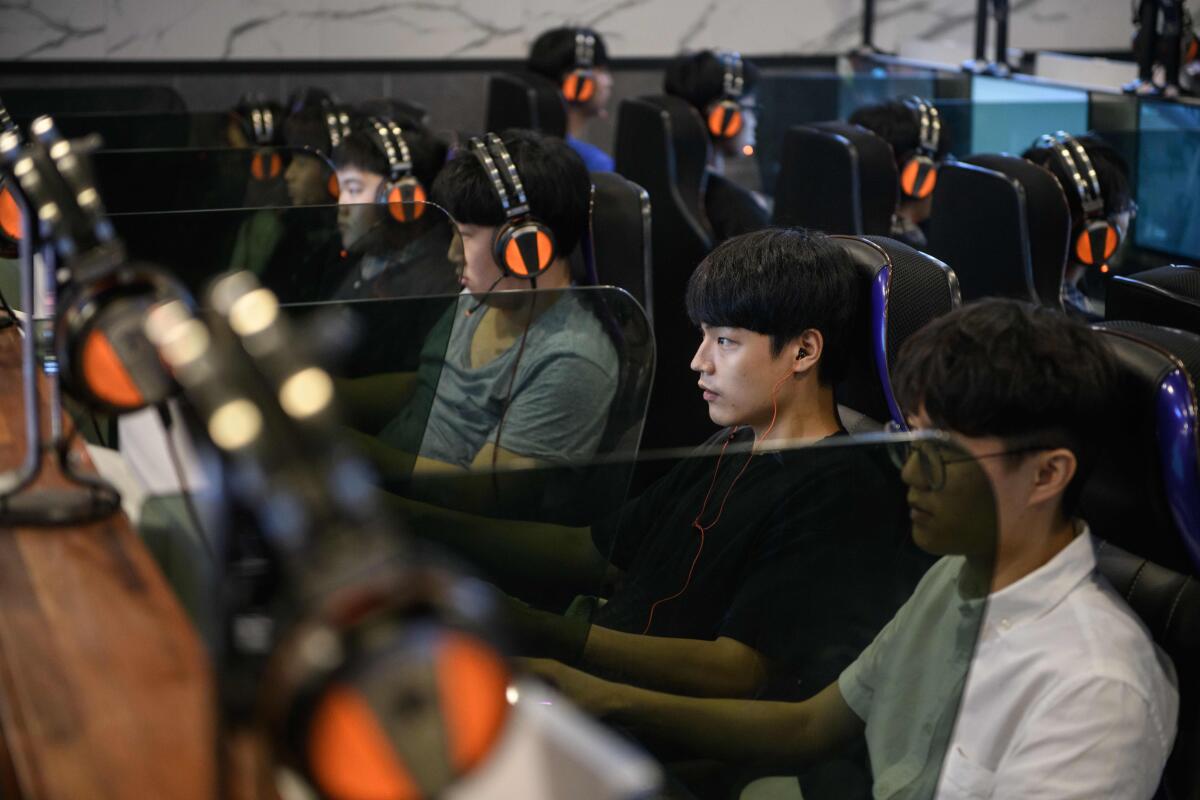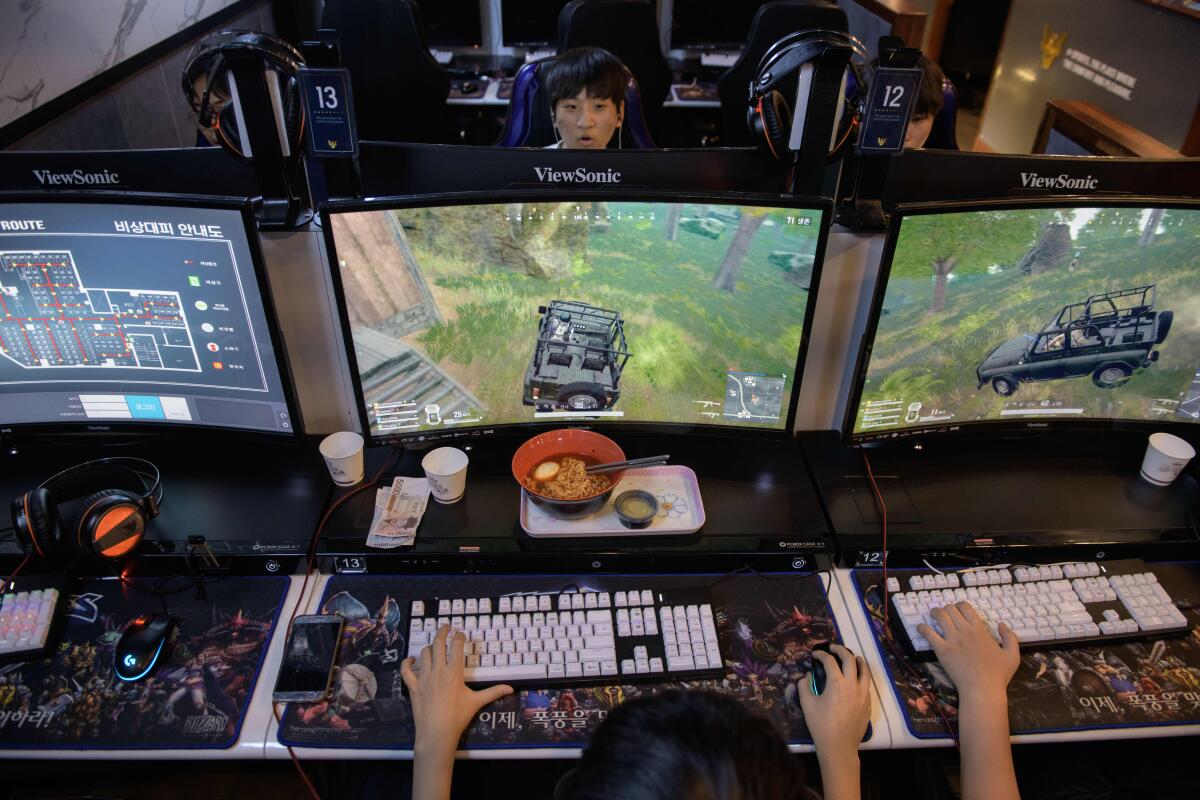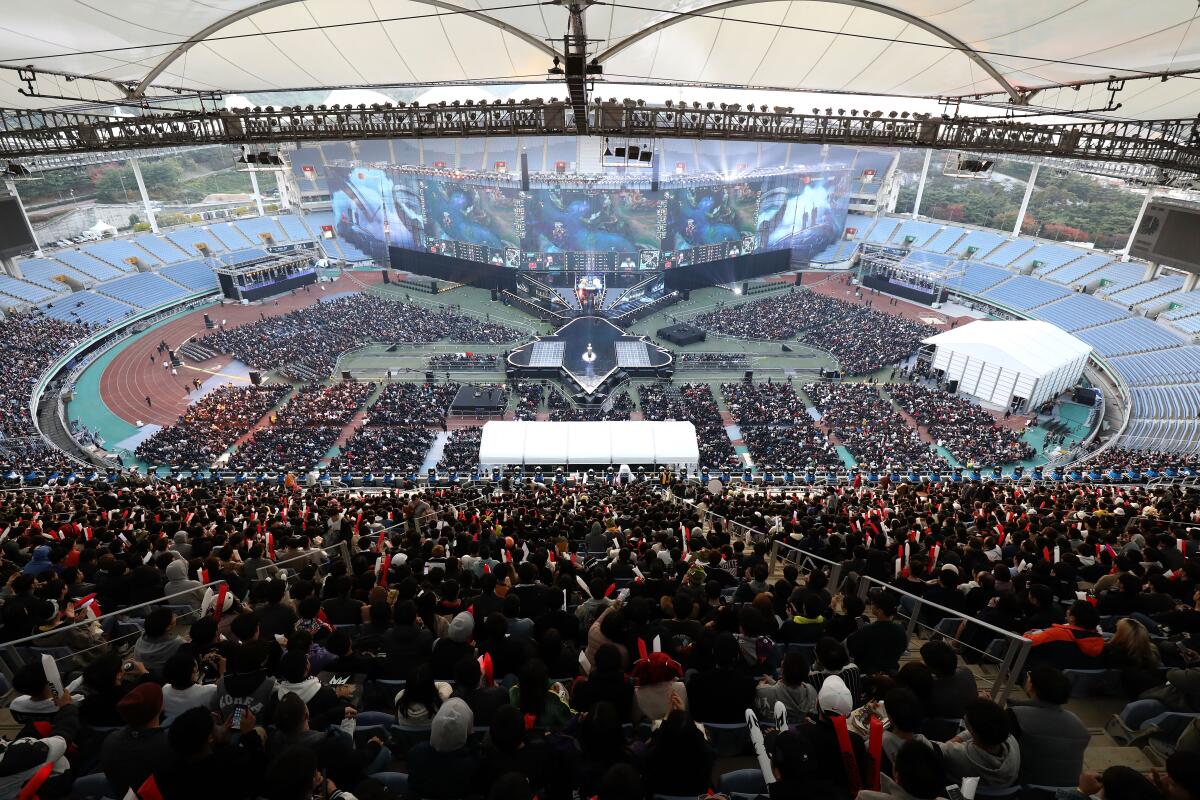He played for 72 hours straight: South Korea wrestles with video game addiction

- Share via
SEOUL — His video game habit started in middle school.
His bedroom door was always locked, and when his grandmother stood on the veranda and peered through his window, he was invariably engrossed in an on-screen gunfight.
He eventually began disappearing to play at internet cafes. Night after night, she would search for him, and he would try to evade her.
Now he is 21 and unemployed. In June at his grandfather’s funeral, he played games on his phone.
“There wasn’t a day he’d go without playing,” said his grandmother, who raised him and felt so ashamed by his situation that she would speak only on condition that her family not be named. “Games ruined the child.”
That’s a controversial opinion in South Korea these days.
Video games are practically the national pastime, played by the majority of adults and more than 90% of adolescents. Rising concerns over the effects of games on mental health have been met with skepticism and disdain by the $13-billion gaming industry.
The debate intensified in May after the World Health Organization officially added “internet gaming disorder” to the 2022 edition of its International Classification of Diseases, which sets global standards for diagnosis.

That was a welcome development to many of South Korea’s mental health professionals, who say the classification will broaden understanding of the problem and improve treatment.
They point to multiple incidents of gamers dying after playing for days with little food or sleep. In 2009, a couple became so consumed by games that they allowed their infant daughter to die of malnutrition — landing them in prison for negligent homicide.
The South Korean government, which has assembled a panel of experts and industry insiders to study the issue, could add “gaming disorder” to its own diagnostic “Korean Standard Classification of Diseases” as soon as 2025.
The country’s gaming industry argues that the classification will have dire economic consequences.
Only the United States, China and Japan have bigger gaming sectors than South Korea, which exported $6 billion in games in 2017 — more than 10 times what the country’s K-pop music industry brought in.
“It’ll be a disaster,” said Kim Jung-tae, a professor of game studies at Dongyang University and a veteran game developer who signed onto a task force pledging to fight the disease classification. “The entire ecosystem of the game industry could collapse.”
He called the push to recognize problematic gaming as an addiction a “witch hunt” perpetrated by psychiatrists and bureaucrats who stand to profit from funding for research and treatment as well as parents eager to explain away their children’s academic failures.
He said he worried that increased regulation would spur gaming companies to move their operations overseas.
“It’s part of a phobia of new media,” he said. “Games, like air, are already a part of our lives.”
The Ministry of Culture, Sports and Tourism, which is tasked with promoting and supporting the gaming industry, has estimated that the gaming disorder designation will reduce revenue by $9 billion over the next three years and cost 8,700 jobs.
It has lobbied the World Health Organization to drop the classification and urged South Korea to reject it, putting it at odds with the Health Ministry.
Mental health advocates say concerns that the industry will come crashing down are overblown.

“Alcoholics don’t blame the company that makes the liquor,” said Roh Sung-won, an addiction specialist and professor of psychiatry at Hanyang University Hospital in Seoul. “You don’t stop manufacturing cars because there are automobile accidents.”
Roh said one of his patients was a video game addict who was hospitalized for a month for psychiatric care, after the owner of an internet cafe got worried about him and called police. The man had been playing for 72 hours straight.
“There clearly exists a population for whom this is a problem,” Roh said.
Still, there are divisions among mental health experts over whether excessive gaming should be classified as a mental disorder.
Some say game addiction is in most cases a sign of other underlying mental health issues including depression or ADHD. They also say it may be a manifestation of problems within the family, and the treatment needed may be for something other than the problematic gaming itself.
The American Psychiatric Assn. has said that between 0.3% and 1% of the U.S. population might potentially be diagnosed with acute gaming disorder but that the issue needs more research.
Studies conducted primarily in Asia “suggest that when these individuals are engrossed in Internet games, certain pathways in their brains are triggered in the same direct and intense way that a drug addict’s brain is affected by a particular substance,” the organization said in a 2013 brief. “The gaming prompts a neurological response that influences feelings of pleasure and reward, and the result, in the extreme, is manifested as addictive behavior.”
Dr. Allen Frances, who chaired the task force that oversaw the production of a past edition of the Diagnostic and Statistical Manual of Mental Disorders, the bible of U.S. psychiatry, tweeted that recognizing gaming disorder could help some people but also carries the risk of mislabeling “millions of normal recreational gamers.”
Though there are support groups for sex addicts and food addicts, gambling is the only behavioral addiction recognized in current U.S. or international diagnostic manuals.
South Korea has long been at the vanguard of concern about addiction to video games.
In 2011, the country passed the so-called Cinderella Law requiring games to include automatic shutdown for children 15 or younger after midnight. Most teens quickly found work-arounds using VPN connections or signing on as their parents.
Two years later, a lawmaker proposed legislation classifying games alongside alcohol, drugs and gambling as major addictions to be battled by society. The proposal was debated for years before fizzling.
In response to growing concerns, the video game industry established a Game Culture Foundation to promote the idea that gaming is a cultural asset rather than a social ill. The foundation set up five clinics around South Korea to treat what it calls “game overindulgence.”
In the last five years, they have treated 17,000 people, according to researchers.
“Alcoholics don’t blame the company that makes the liquor. You don’t stop manufacturing cars because there are automobile accidents.”
— Roh Sung-won, addiction specialist and professor of psychiatry, Hanyang University Hospital
For the 21-year-old raised by his grandmother, visits to hospitals and clinics over the years never worked. Each time, he’d give up after one or two sessions.
Addiction ran in the family. His grandfather was an alcoholic who for decades drank several bottles a day — usually soju, but he wasn’t picky — until his recent death due to cancer.
The parallels seemed obvious to the woman who lived with both of them: the constant need for a fix, the deceit involved in hiding their habits, the inability to quit.
Her grandson disputes the idea that he was ever addicted to video games, even though he routinely missed school because he would play for 12 hours at a stretch.
Many of the video games he played featured the opportunity to buy “loot boxes,” which contain randomized prizes.
It wasn’t much of leap into another addiction that he readily acknowledges: gambling.
He began dabbling in illegal offshore sports betting websites. In recent years, he resorted to petty fraud to get gambling cash — like selling his motorcycle to multiple people online.
He was arrested in July on fraud charges related to his gambling debts and is currently in jail awaiting trial.
In an interview from behind a window, he said he doesn’t think much about video games anymore.
“I just played whenever I felt empty and depressed,” he said as a 10-minute countdown clock flashed.
His grandmother has been traveling an hour and half every day, taking a bus, a train, then another bus to visit him.
She often finds herself thinking back to his elementary school days, when a soccer coach suggested that her grandson had talent and that she should sign him up for lessons. The family couldn’t afford it — but now she wonders whether it would have made all the difference.
More to Read
Sign up for Essential California
The most important California stories and recommendations in your inbox every morning.
You may occasionally receive promotional content from the Los Angeles Times.











